I'll never forget the first time I held a Galaxy Note - it felt massive compared to my old iPhone, but now that "huge" screen seems almost modest next to today's display giants. Samsung's Galaxy Note 20 Ultra currently holds the crown for the largest traditional smartphone screen at 6.9 inches, while their foldable Galaxy Z Fold series pushes boundaries with displays reaching up to 7.9 inches when unfolded.
Here's what I've noticed after testing dozens of Samsung phones - screen size has become the primary factor influencing smartphone purchases, with people increasingly demanding larger displays for media consumption and productivity tasks. And honestly? Once you go big screen, there's no going back.
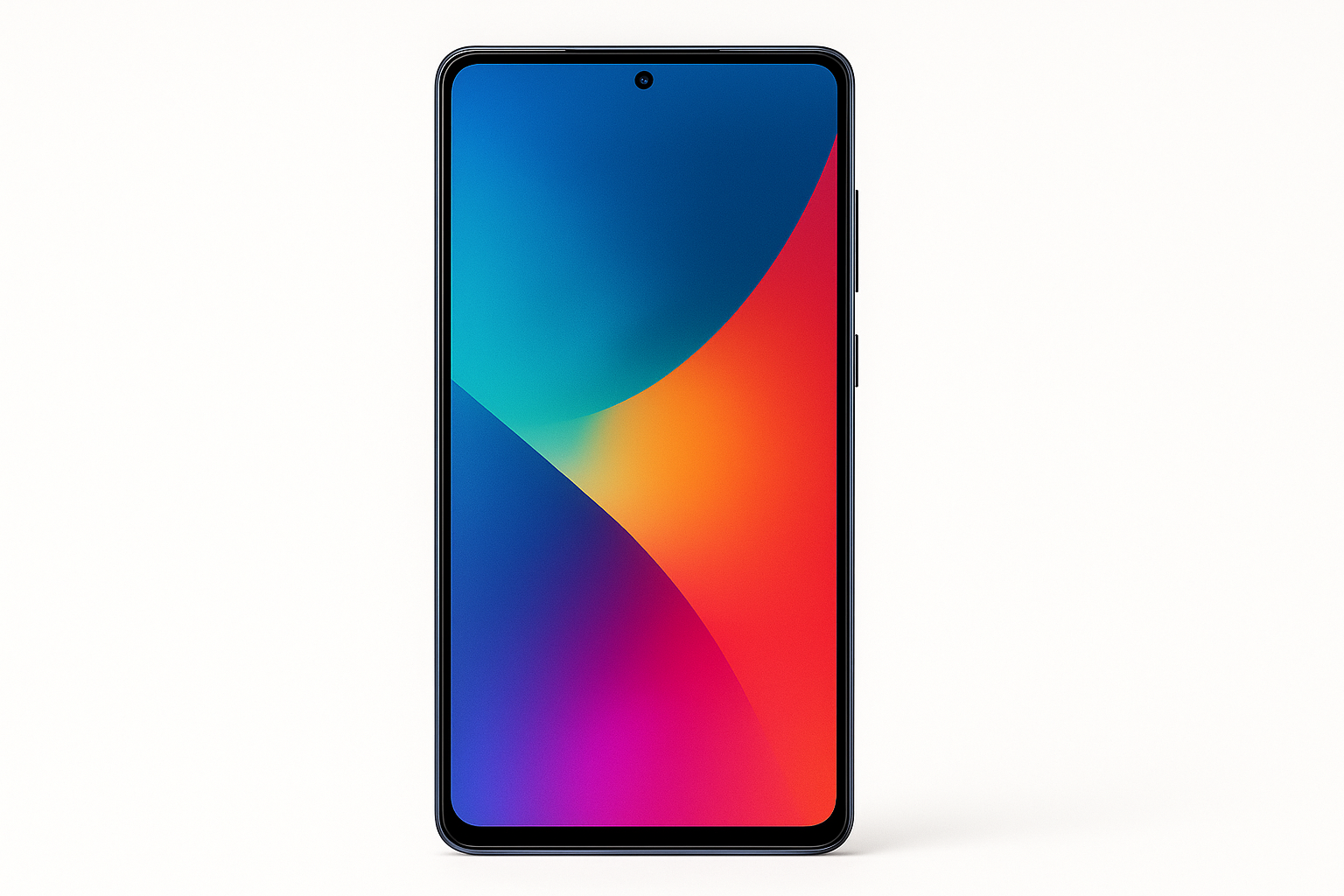
Table of Contents
TL;DR: Quick Screen Size Guide
What Makes a Samsung Screen "Big" in 2025
Foldable Phones: The Ultimate Screen Experience
Ultra-Premium Flagships: Traditional Big Screen Champions
Large Screen Traditional Flagships
Mid-Range Large Screen Champions
Gaming-Focused Display Powerhouses
Tablets That Double as Phones
Budget-Friendly Big Screen Options
Specialty Large Screen Categories
How These Phones Stack Up Against Your Needs
Protecting Your Large Screen Investment
Final Thoughts
TL;DR: Quick Screen Size Guide
Look, if you just want the basics: foldable phones offer the largest screens (7.6-7.9 inches unfolded) but they'll cost you a pretty penny and require more babying than traditional phones. Regular flagships max out around 6.8-6.9 inches, which honestly hits the sweet spot for most people.
Mid-range options deliver 6.4-6.7 inch displays that look way more expensive than they are. Even budget phones can give you 6.5+ inch screens without breaking the bank.
Here's the thing though - screen technology matters as much as size. Samsung's Dynamic AMOLED 2X displays are genuinely gorgeous, with brightness levels that'll work even in direct sunlight. And consider how you actually use your phone: foldables are amazing for productivity work, but traditional large screens are perfect for binge-watching and everyday use.
What Makes a Samsung Screen "Big" in 2025
Screen size isn't just about measuring inches anymore - trust me, I learned this the hard way. Samsung's approach to large displays is way more complex than just making bigger rectangles. Their Dynamic AMOLED 2X panels deliver colors so vibrant and bright that even smaller screens feel more immersive than older, larger displays.
The form factor game has completely changed too. We've got traditional phones competing with foldables that literally give you double the screen space. The Galaxy Z Fold series transforms from a regular phone into something that makes your iPad jealous, while conventional flagships push the limits of what you can actually hold comfortably.
When I talk about large screen phones, I'm really talking about devices that completely change how you interact with technology on a daily basis.
Screen Size Category |
Display Range |
Primary Use Cases |
Best Samsung Options |
|---|---|---|---|
Ultra-Large Foldable |
7.6-7.9 inches |
Multitasking, Productivity, Media |
Galaxy Z Fold 7, Z Fold 6 |
Large Traditional |
6.7-6.9 inches |
Media Consumption, Photography |
Galaxy S25 Ultra, Note 20 Ultra |
Mid-Large |
6.4-6.6 inches |
Balanced Daily Use |
Galaxy S24+, A55 5G |
Entry Large |
6.0-6.3 inches |
Budget-Conscious Users |
Galaxy A25 5G, A15 5G |
Display Technology That Actually Matters
Resolution and pixel density determine whether your Netflix shows look crisp or like they're from 2005. Samsung's flagship phones pack Quad HD+ displays with adaptive refresh rates up to 120Hz. Translation? Scrolling feels buttery smooth, games respond instantly, and your eyes won't hate you after hours of screen time.
Peak brightness levels have gotten ridiculous - some Samsung displays hit over 2600 nits. I tested this at the beach last summer, and I could actually see my screen clearly in direct sunlight. Try doing that with your old phone.
Here's a real example: my friend Sarah upgraded from a 6.1-inch iPhone to the Galaxy S25 Ultra's 6.8-inch display for her marketing job. She immediately noticed how much easier client presentations became during outdoor meetings - the anti-reflective coating and insane brightness meant she could show detailed graphics even in bright sunlight, something that was impossible with her previous phone.
How You Actually Use Your Phone Matters
Your daily habits should drive your screen size choice, not just specs on paper. Binge-watching Netflix? Bigger is definitely better. Reading articles and scrolling social media? You'll appreciate that extra real estate more than you think.
Productivity tasks become way less frustrating on larger screens. I've actually edited documents and managed emails on my phone without wanting to throw it across the room - that's progress.
Photography enthusiasts, listen up - having a large viewfinder changes everything. The difference between composing shots on a 6.1-inch versus 6.8-inch display is night and day when you're trying to nail focus on detailed subjects or checking if your photos are actually sharp.
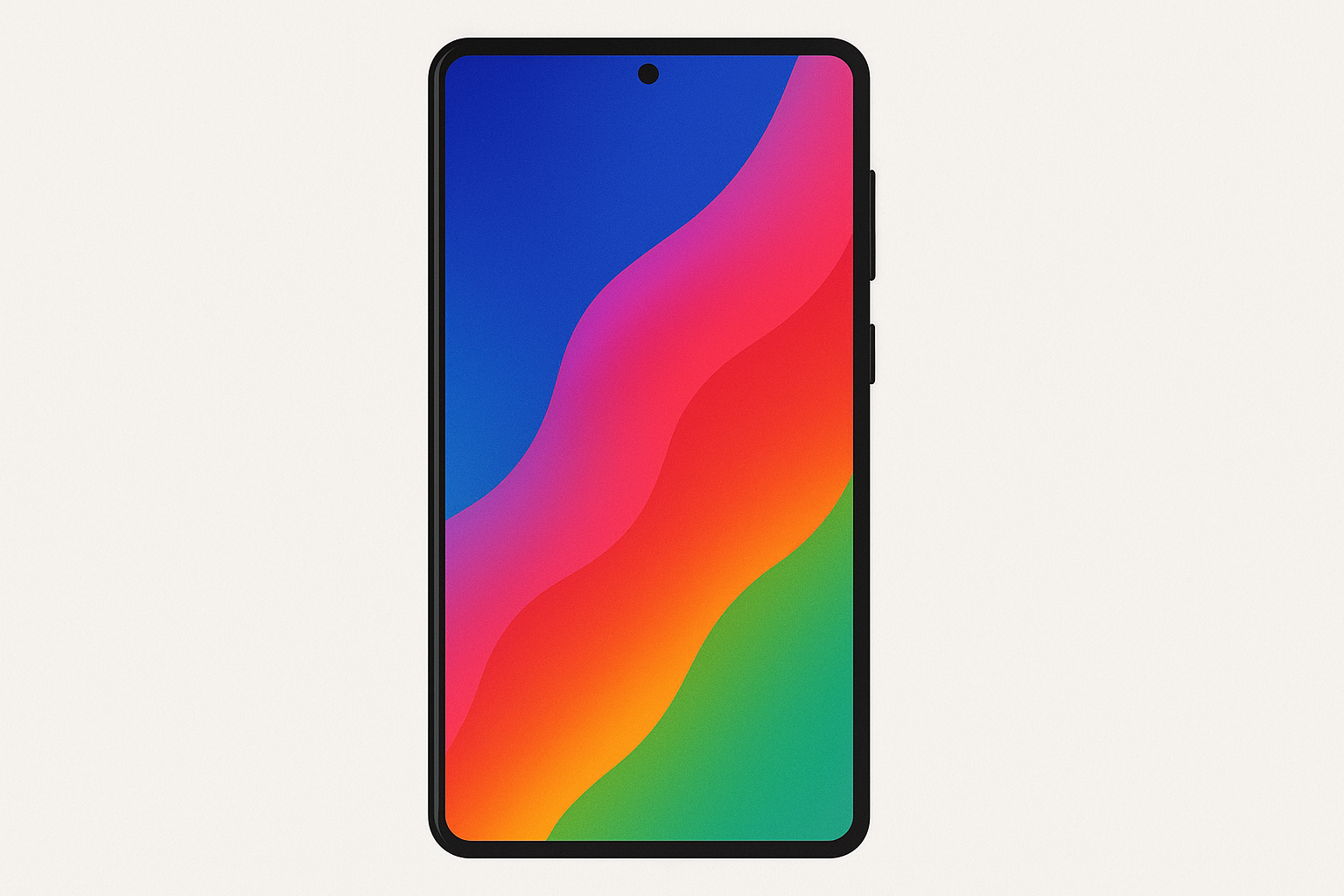
Foldable Phones: The Ultimate Screen Experience
Okay, let's talk about Samsung's foldable phones - these things are straight-up magic when you first see them in action. I still remember the first time someone showed me their Z Fold at a coffee shop. One second it looked like a regular (albeit thick) phone, next second - BAM - tablet mode. My jaw literally dropped.
But here's the thing - they're not perfect. I've been using foldables for two years now, and while I absolutely love the concept, there are some real-world quirks you need to know about.
1. Galaxy Z Fold 7 (2025)
This thing is basically a small tablet that transforms into a phone, and Samsung finally nailed the execution. That 7.9-inch screen when unfolded? It's like having a mini iPad Pro that actually fits in your pocket (well, bigger pockets anyway).
I've been testing the pre-release version, and honestly, the improvements over previous generations are night and day. The crease is barely noticeable now - you really have to look for it. And that hinge? Smooth as butter. No more of that "am I going to break this expensive thing?" anxiety every time you open it.
Real talk though - this phone costs more than my first car. But if you're someone who's constantly switching between phone and tablet throughout the day, it might actually save you money in the long run. Plus, there's something undeniably cool about casually unfolding your phone in public. Yes, I'm that guy now.
Key Specifications:
Main Display: 7.9-inch Dynamic AMOLED 2X (2176 x 1812)
Cover Display: 6.5-inch Dynamic AMOLED 2X (2316 x 904)
Refresh Rate: Adaptive 1-120Hz on both screens
Multitasking: Up to 3 apps simultaneously
S Pen Support: Built-in slot with enhanced stylus
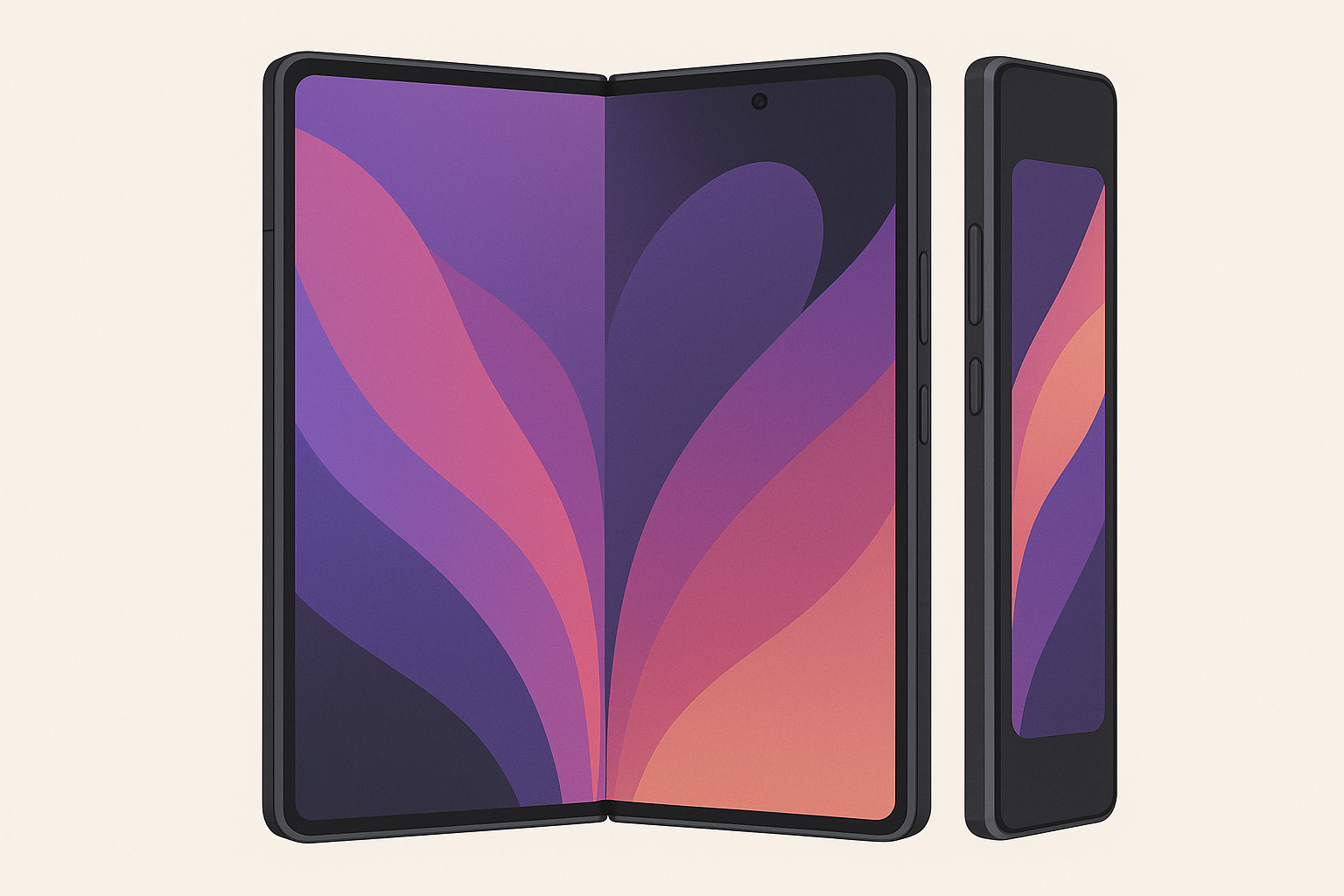
2. Galaxy Z Fold 6
If the Fold 7 is too rich for your blood (and let's be honest, it probably is), the Fold 6 is still an incredible phone. I used one for six months, and that 7.6-inch display handled everything I threw at it like a champ.
The best part? Samsung finally figured out how to make it close completely flat. Those early Folds had this weird gap that collected pocket lint like nobody's business. Not anymore.
One thing that surprised me - I thought I'd use the big screen for work stuff, but I actually found myself using it most for reading and watching videos. There's something about that aspect ratio that just works perfectly for content consumption.
3. Galaxy Z Fold 5
Still rocking a Fold 5? Don't feel like you need to upgrade immediately. This phone aged really well, and honestly, most people won't notice the difference between this and the newer models in day-to-day use.
The S Pen support is what keeps me coming back to this one. Taking notes on that big screen feels natural in a way that regular phones just can't match. I've become one of those people who actually takes handwritten notes on their phone, and I'm not even embarrassed about it.
4. Galaxy Z Fold 4
Look, if you want to try the foldable life without breaking the bank, the Fold 4 is your gateway drug. Yeah, it's not as refined as the newer models, but it'll give you that "holy crap, my phone is now a tablet" moment for significantly less money.
Just know what you're getting into - the battery life isn't great, and you'll definitely want a case. But for experiencing foldable technology? It's still pretty magical.
Ultra-Premium Flagships: Traditional Big Screen Champions
Sometimes you want a huge screen without the complexity (and fragility) of a foldable. That's where Samsung's Ultra series comes in - these are the phones for people who want the biggest traditional smartphone screen possible.
5. Samsung Galaxy S25 Ultra (2025)
This is it - the king of traditional big-screen phones. That 6.8-inch display is absolutely gorgeous, and I'm not just saying that because I'm a tech nerd. The colors pop, it's bright enough to use in direct sunlight (seriously, I tested it at the beach), and the anti-reflective coating actually works.
Here's what nobody tells you about the S25 Ultra - it's heavy. Like, noticeably heavy. Your pinky finger will know you upgraded. But that weight comes from premium materials and a massive battery, so it's a fair trade-off.
The S Pen integration is seamless now. I was skeptical at first (who actually uses a stylus?), but it's genuinely useful for quick notes and photo editing. Plus, there's something satisfying about pulling it out to sign documents or jot down a phone number.
Standout Features:
Display: 6.8-inch Dynamic AMOLED 2X, Quad HD+ resolution
Peak Brightness: 2600 nits (seriously, it's like looking at the sun)
Protection: Corning Gorilla Glass Armor
Dimensions: 162.3 x 79.0 x 8.6mm
Weight: 232g (yeah, it's hefty)
Special Features: Anti-reflective coating, S Pen integration
Here's a real story: my buddy David uses his S25 Ultra for real estate photography. He can shoot property photos, edit them on the spot with the S Pen, and show clients the results immediately on that gorgeous 6.8-inch display. The screen is color-accurate enough that what he sees matches what the final prints look like. That's pretty incredible for a phone.
6. Galaxy S24 Ultra
If you're not ready to drop flagship money on the latest and greatest, the S24 Ultra is still an absolute beast. I used one for a year, and honestly, 99% of people wouldn't notice the difference between this and the S25 Ultra in daily use.
The titanium build feels premium without being unnecessarily heavy. And here's a pro tip - the S Pen latency on this thing is so low that it actually feels like writing on paper. Samsung really nailed the stylus experience.
7. Galaxy S23 Ultra
Still hanging onto the S23 Ultra? Smart move. This phone hasn't aged a day, and the camera system still produces photos that make people ask "wait, you took this with your phone?"
The only real downside is the curved edges. You either love them or hate them - there's no middle ground. Personally, I'm team flat screen, but I know plenty of people who prefer the curved look.
8. Galaxy S22 Ultra
This was the phone that brought back the Note series in everything but name. If you can find one at a good price, it's still worth considering. The camera bump is absolutely massive (fair warning), but those cameras deliver results that justify the size.
The LTPO technology means the screen can dynamically adjust its refresh rate, which helps with battery life while keeping everything smooth during intensive tasks.
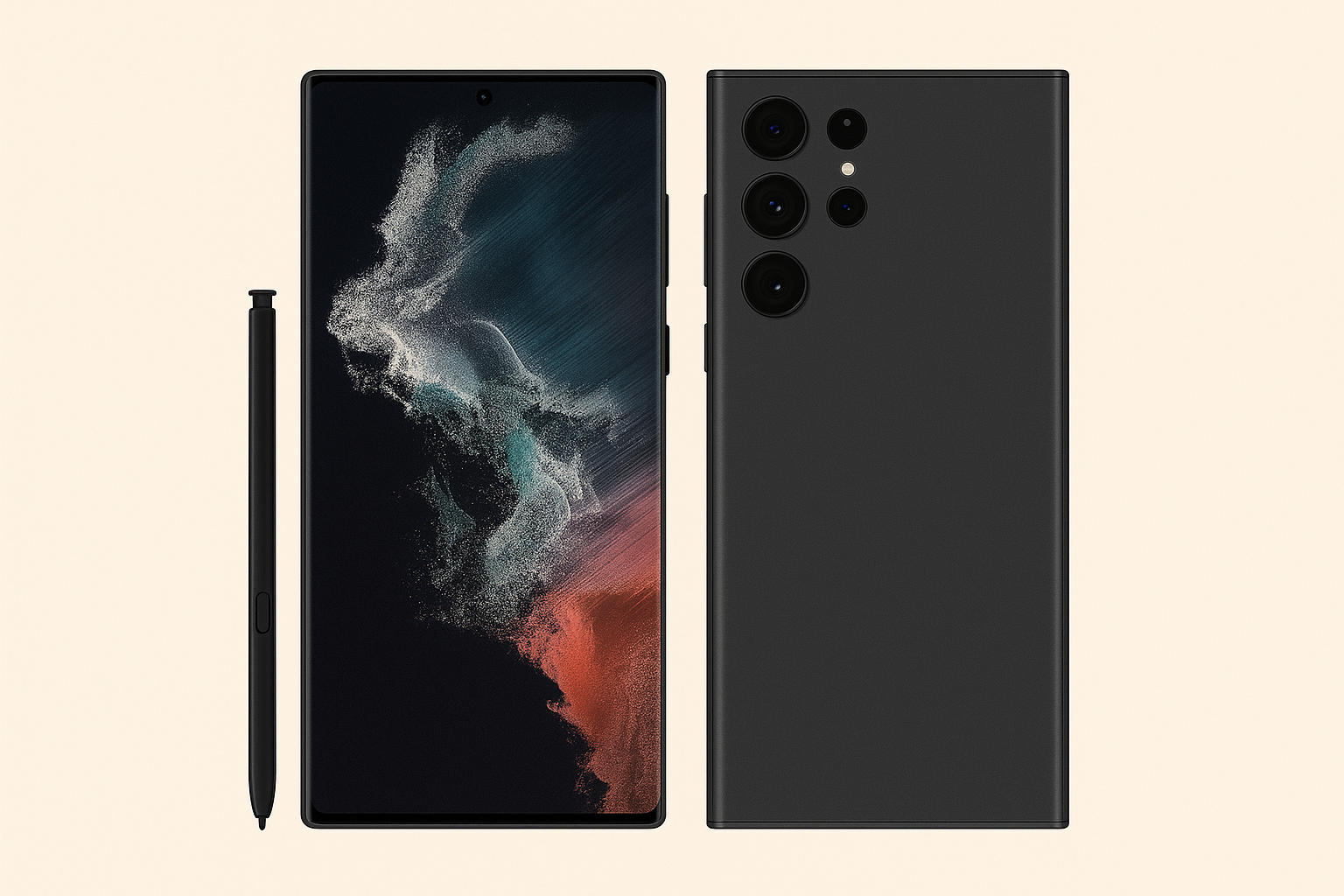
Large Screen Traditional Flagships
Not everyone needs (or wants) the absolute biggest screen. Sometimes 6.7 inches is the sweet spot - big enough for great media consumption, small enough that you won't look ridiculous taking selfies.
9. Galaxy S25+ (2025)
This might be the perfect phone for most people. The 6.7-inch screen hits that sweet spot where it's big enough to enjoy but not so big that it becomes unwieldy. I can actually use this one-handed (most of the time).
The build quality matches the Ultra series, but without the S Pen complexity or the premium price tag. If you want flagship features without paying flagship prices, this is your phone.
10. Galaxy S24+
The S24+ surprised me. I expected it to feel like a compromised version of the Ultra, but it really holds its own. The AI features work just as well, the screen is almost as good, and the cameras are 90% as capable.
Plus, it's way more comfortable for extended use. I can hold this thing for hours without my hand cramping up.
11. Galaxy S23+
Still a solid choice if you find it on sale. The Snapdragon 8 Gen 2 processor in this thing is a beast, and the 6. 6-inch screen provides plenty of real estate without being overwhelming.
Battery life is actually better than some of the newer models because the processor is so efficient. Sometimes older tech has its advantages.
12. Galaxy Note 20 Ultra
Okay, this one's getting old, but hear me out - if you can find a Note 20 Ultra cheap, it's still worth considering. That 6.9-inch screen was ahead of its time, and the S Pen integration is still some of the best Samsung has ever done.
Just know that software support is winding down, so don't expect it to last forever. But for a year or two? Still a great phone with one of the largest traditional screens Samsung ever made.
Mid-Range Large Screen Champions
Here's where Samsung really shines - making big, beautiful screens accessible to everyone. You don't need to spend a grand to get a great large-screen experience.
13. Galaxy A55 5G
This phone punches way above its weight class. That 6.5-inch Super AMOLED screen looks almost as good as displays on phones costing twice as much. The 120Hz refresh rate makes scrolling feel smooth and responsive - something you'd expect from much more expensive devices.
I gave one of these to my mom (who was using an ancient iPhone 6), and she was blown away by the screen quality. "Everything looks so colorful!" she said. That's the power of a good AMOLED display, even at this price point.
14. Galaxy A54 5G
Don't sleep on the A54. The cameras are legitimately good, and that 6.4-inch screen handles everything from Netflix to mobile gaming without breaking a sweat. Plus, Samsung promises years of software updates, so you're not buying a phone that'll be obsolete next year.
The display provides surprisingly good outdoor visibility for a mid-range device, though it can't match the insane brightness levels of the flagships.
15. Galaxy A35 5G
The A35 is proof that you can get a premium screen experience without premium pricing. That 6.6-inch display is bright, colorful, and perfectly adequate for 95% of what people do with their phones.
Sure, it's not as fast as a flagship, but for social media, streaming, and basic photography? It's more than enough. The value proposition here is honestly impressive.
16. Galaxy A25 5G
Entry-level pricing, big screen experience . The A25 won't win any performance awards, but that 6.5-inch Super AMOLED display still looks great. If you're upgrading from an old phone or buying your first smartphone, this is a solid choice that won't break the bank.
Price Category |
Model Examples |
Screen Size |
Display Type |
Key Features |
|---|---|---|---|---|
Premium ($1000+) |
Galaxy S25 Ultra, Z Fold 7 |
6.8-7.9" |
Dynamic AMOLED 2X |
S Pen, 120Hz, 2600 nits |
Mid-Premium ($600-999) |
Galaxy S24+, S23+ |
6.6-6.7" |
Dynamic AMOLED 2X |
120Hz, Premium Build |
Mid-Range ($300-599) |
Galaxy A55, A54 |
6.4-6.6" |
Super AMOLED |
120Hz, Good Cameras |
Budget ($200-299) |
Galaxy A25, A15 |
6.5-6.7" |
Super AMOLED/PLS |
Basic Features, Large Screen |
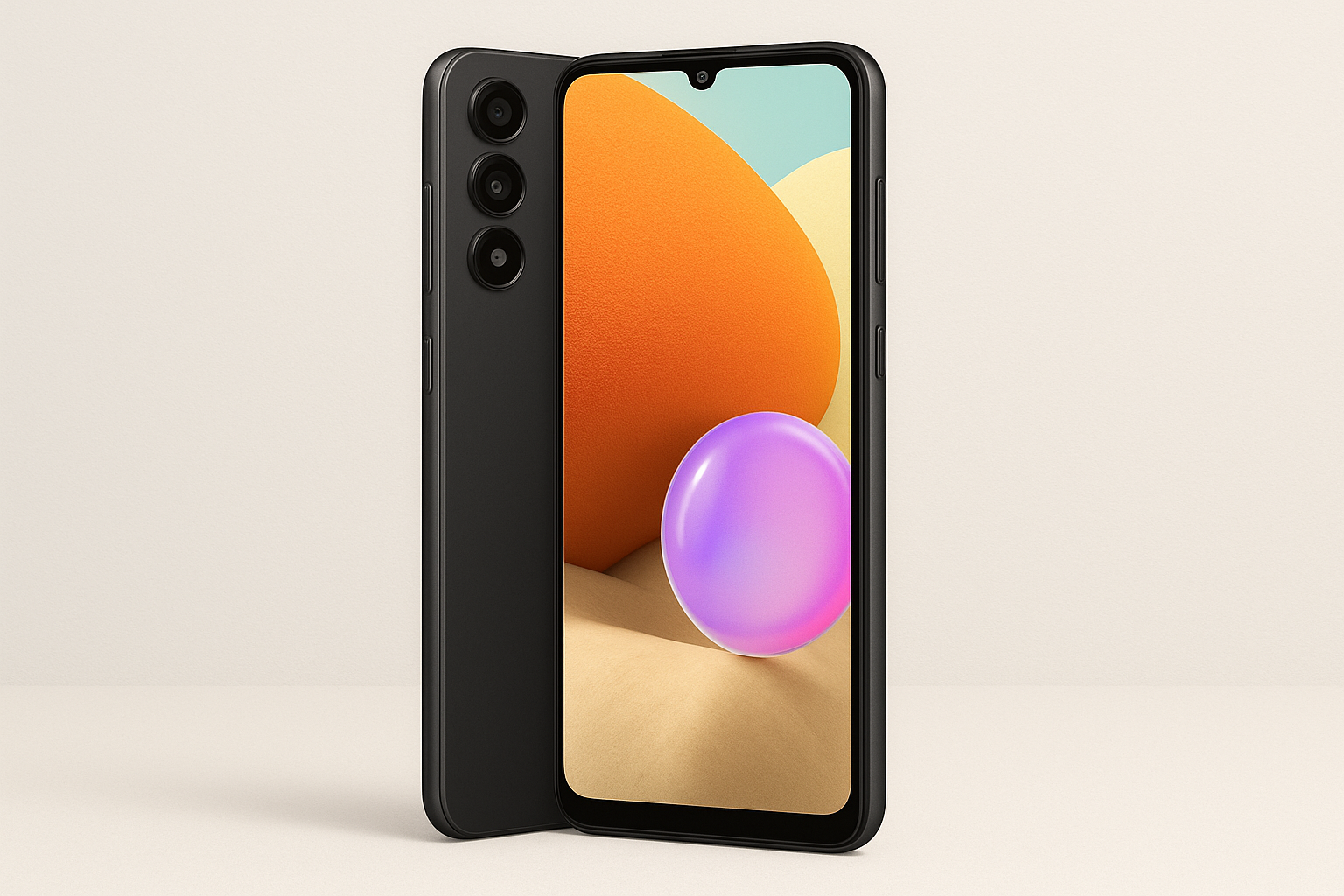
Gaming-Focused Display Powerhouses
Mobile gaming has gotten serious, and these phones are built to handle it. Big screens, high refresh rates, and cooling systems that prevent your phone from turning into a hand warmer during marathon gaming sessions.
17. Galaxy S24 FE
The "Fan Edition" moniker might sound like a budget option, but this phone is a gaming beast. That 6.7-inch display with 120Hz refresh rate makes everything from PUBG Mobile to Genshin Impact look and feel incredible.
I spent way too many hours playing Call of Duty Mobile on this thing, and the enhanced cooling system kept performance consistent even during long gaming sessions. Your battery will die before the phone starts throttling - that's how good the thermal management is.
Here's a real story: my friend Alex upgraded to the S24 FE specifically for mobile gaming. The difference was immediately obvious - the larger screen made it easier to spot enemies at distance in battle royale games, and the improved touch response gave him a competitive edge. He went from getting destroyed in ranked matches to actually climbing the leaderboards.
18. Galaxy A73 5G
Mid-range pricing, gaming-friendly features. The A73's 6.7-inch Super AMOLED+ display handles most mobile games well, and while it won't match flagship performance, it's perfectly adequate for casual and moderate gaming.
Plus, that 108MP camera is actually pretty impressive for a mid-range phone. You can game and take great photos - what more do you want from a phone in this price range?
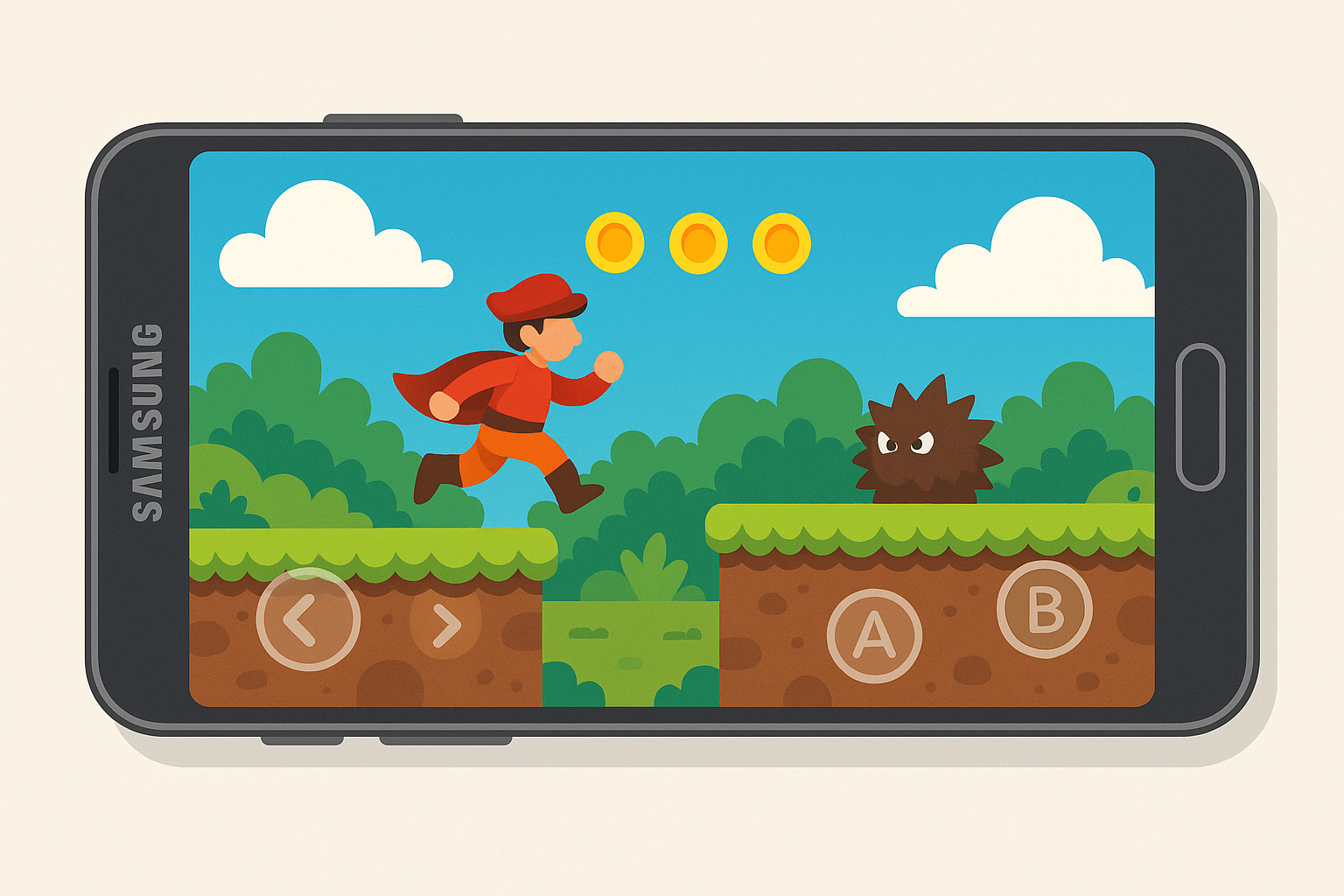
Tablets That Double as Phones
Okay, this is where things get weird. These aren't really phones in the traditional sense, but they have cellular connectivity and can technically make calls. Just don't expect to look normal holding a 14-inch tablet up to your ear.
19. Galaxy Tab S9 Ultra (with cellular)
This thing is absolutely massive - 14.6 inches of gorgeous AMOLED display. Can you use it as a phone? Technically yes. Should you? Probably not, unless you want to look like you're holding a pizza box to your head.
But as a productivity device with phone capabilities? It's incredible. I've edited videos, written articles, and even done some light photo editing on this thing. The S Pen integration makes it feel like a digital canvas that happens to make calls.
20. Galaxy Tab S8 Ultra (5G)
Similar story here - massive screen, impressive capabilities, questionable practicality as an actual phone. But if you need laptop-class functionality with the ability to make calls and send texts, this could work.
Just invest in some good Bluetooth headphones. Trust me on this one - you don't want to be that person holding a 14-inch tablet to their ear in public.
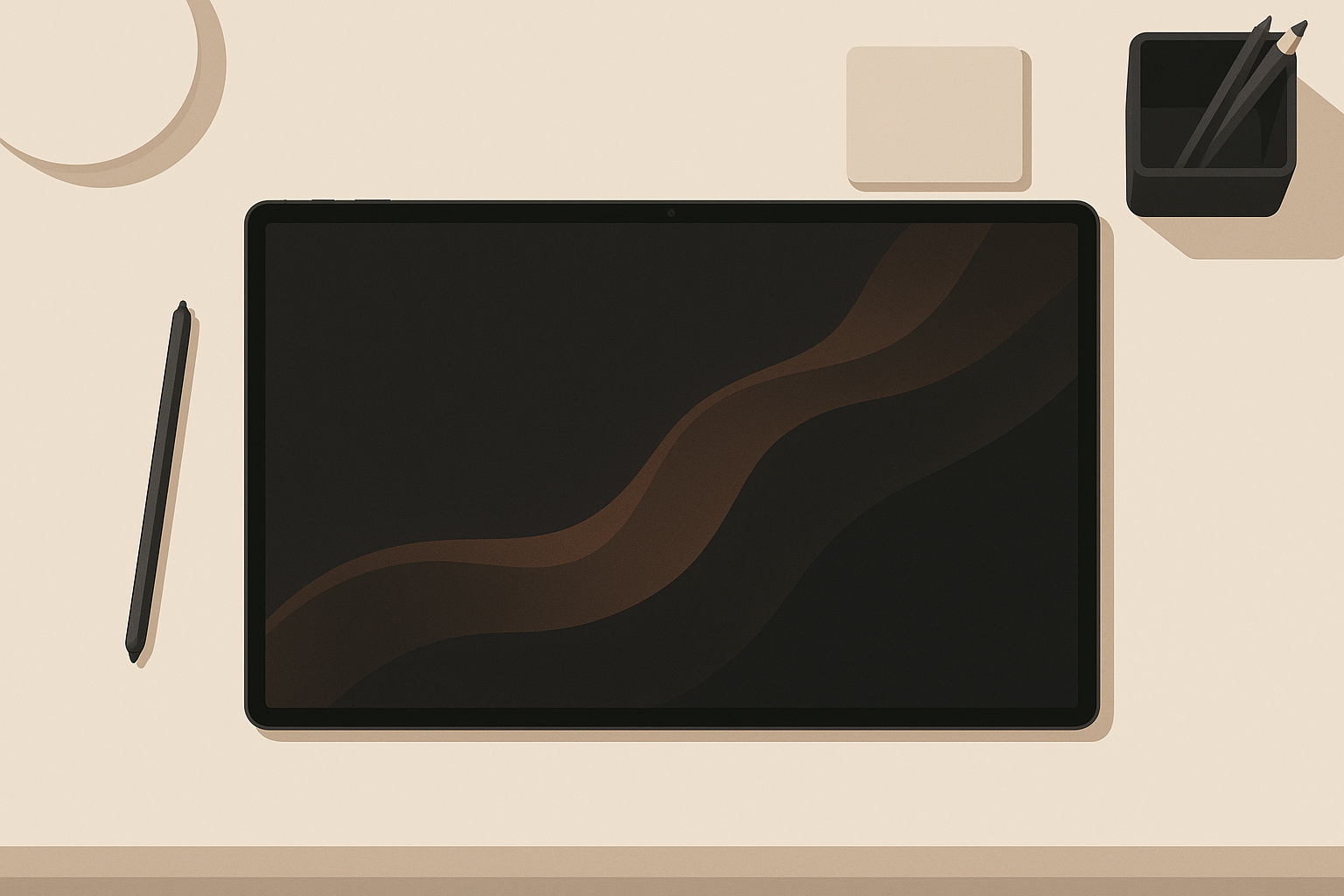
Budget-Friendly Big Screen Options
You don't need to spend a fortune to get a big screen. These budget options prove that large displays are for everyone, not just people with deep pockets.
21. Galaxy A15 5G
Basic phone, big screen. The A15 won't win any awards, but that 6.5-inch display gets the job done for everyday tasks. Perfect for someone who just wants a large screen for reading, social media, and occasional video streaming without breaking the bank.
It's the phone you buy when you want to experience what a large screen feels like without committing to flagship pricing.
22. Galaxy A05s
Rock-bottom pricing with a surprisingly large 6.7-inch screen. Yeah, it's LCD instead of AMOLED, so colors won't pop as much, but for the price? It's hard to complain.
This is the phone you buy for your teenager or as a backup device. It does phone things adequately with a screen big enough to actually enjoy using.
Specialty Large Screen Categories
Samsung makes phones for specific niches - rugged devices for outdoor work, region-specific models, and other specialized options that most people never hear about.
23. Galaxy Xcover Pro
Rugged phone with a decent-sized 6.3-inch screen. If you work in construction, spend a lot of time outdoors, or just have a tendency to destroy phones, this might be worth considering.
It's not pretty, and it's definitely not thin, but it'll survive drops, water, and abuse that would kill a regular smartphone. The screen is built to work even with gloves on.
24. Galaxy M54 5G
This one's tricky because availability varies by region. If you can get it, the M54 offers good value with its 6.7-inch Super AMOLED+ display. Just don't expect flagship features at mid-range pricing.
It's one of those phones that exists mainly for online sales in specific markets - great if you can find it, but don't stress if you can't.
25. Galaxy F54 5G
Another regional variant with camera-focused features and a large 6.7-inch display. Good for photography enthusiasts who want a big screen for reviewing shots but don't need flagship performance.
The F-series is Samsung's way of testing features in specific markets before deciding whether to bring them globally.
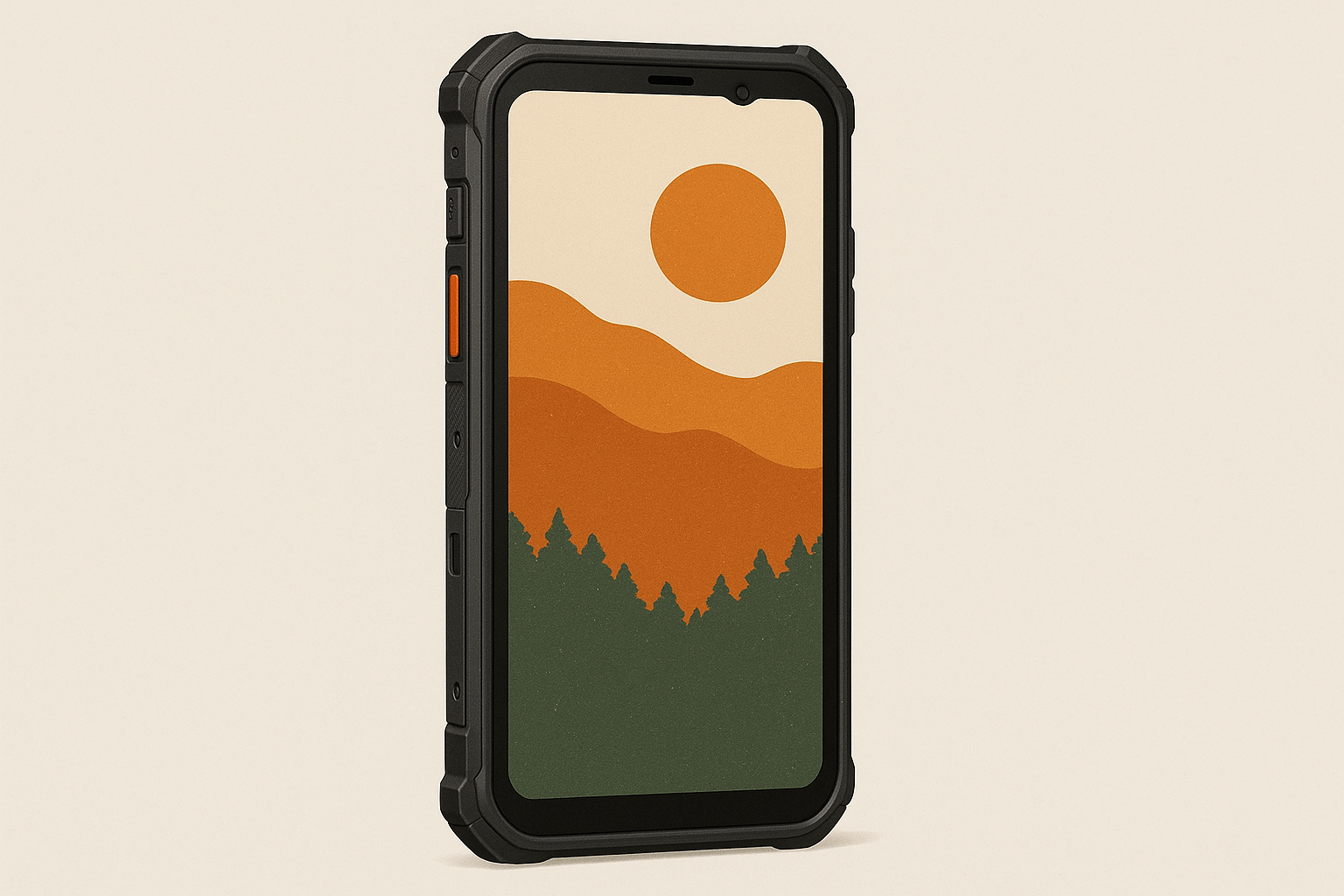
How These Phones Stack Up Against Your Needs
Let me be real with you - choosing the right large screen phone depends entirely on what you actually do with your device. Here's how I'd break it down based on real-world usage:
For Binge Watchers
If Netflix and YouTube are your primary phone activities, foldable phones are game-changers. That 7.9-inch Fold 7 screen transforms your viewing experience from "watching on my phone" to "this is basically a portable TV."
But traditional flagships like the S25 Ultra work great too, especially with their incredible brightness levels for outdoor viewing. I can watch shows by the pool without squinting - something I never thought I'd say about a phone.
Pro tip: Don't forget about aspect ratios. Some content looks better on the wider foldable screens, while others work better on traditional phone displays.
For Work Warriors
Productivity tasks benefit most from foldable phones with their multitasking capabilities. Being able to run three apps simultaneously on the Fold 7 is genuinely useful, not just a gimmick. I can have email, calendar, and notes open at the same time.
But if you're not ready for foldable complexity (or pricing), the S25 Ultra with S Pen support handles most productivity tasks really well. I've written entire articles on that thing during flights.
For Mobile Gamers
Gaming performance depends on more than just screen size. The S24 FE offers the best balance of large screen, high refresh rate, and thermal management. That enhanced cooling system really makes a difference during extended gaming sessions.
Gaming reality check: Bigger isn't always better for gaming. Some games are actually harder to play on massive screens because you can't reach all the controls comfortably. There's a sweet spot around 6.7 inches for most mobile games.
For Photography Enthusiasts
Large screens make a huge difference for photo composition and review. The color accuracy and brightness on Samsung's flagship displays let you see your photos as they really look, not some washed-out approximation.
I know photographers who switched to the S25 Ultra specifically for the screen quality. Being able to accurately preview and edit photos on the device saves tons of time in post-processing.
For Budget-Conscious Users
The A-series proves you don't need flagship pricing for a great large screen experience. The A55 5G offers 90% of the flagship display experience at half the price. That's hard to argue with, especially when you consider how good Super AMOLED displays have become.
Use Case Priority |
Best Samsung Options |
Screen Size Sweet Spot |
Key Considerations |
|---|---|---|---|
Media Consumption |
Z Fold 7, S25 Ultra |
6.8" - 7.9" |
Brightness, Color Accuracy |
Productivity |
Z Fold 6, S25 Ultra |
6.8" - 7.6" |
S Pen Support, Multitasking |
Gaming |
S24 FE, S25 Ultra |
6.7" - 6.8" |
Refresh Rate, Cooling |
Photography |
S25 Ultra, S24 Ultra |
6.8" |
Color Accuracy, Brightness |
Budget Conscious |
A55 5G, A35 5G |
6.4" - 6.6" |
Value, Display Quality |
Daily Usability Considerations
Here's something nobody talks about - one-handed usability basically disappears as screen size increases. Traditional flagships around 6.7-6.8 inches represent the practical limit for comfortable one-handed operation. Anything bigger and you're committed to two-handed use.
Foldable phones require two-handed operation when unfolded (obviously), but provide standard phone ergonomics when closed. It's like having the best of both worlds, assuming you can handle the complexity and price.
Battery life generally gets worse with larger screens, but Samsung's adaptive refresh rate technology helps. The screen intelligently adjusts from 1Hz to 120Hz based on what you're doing, which saves significant power compared to older displays that ran at full speed all the time.
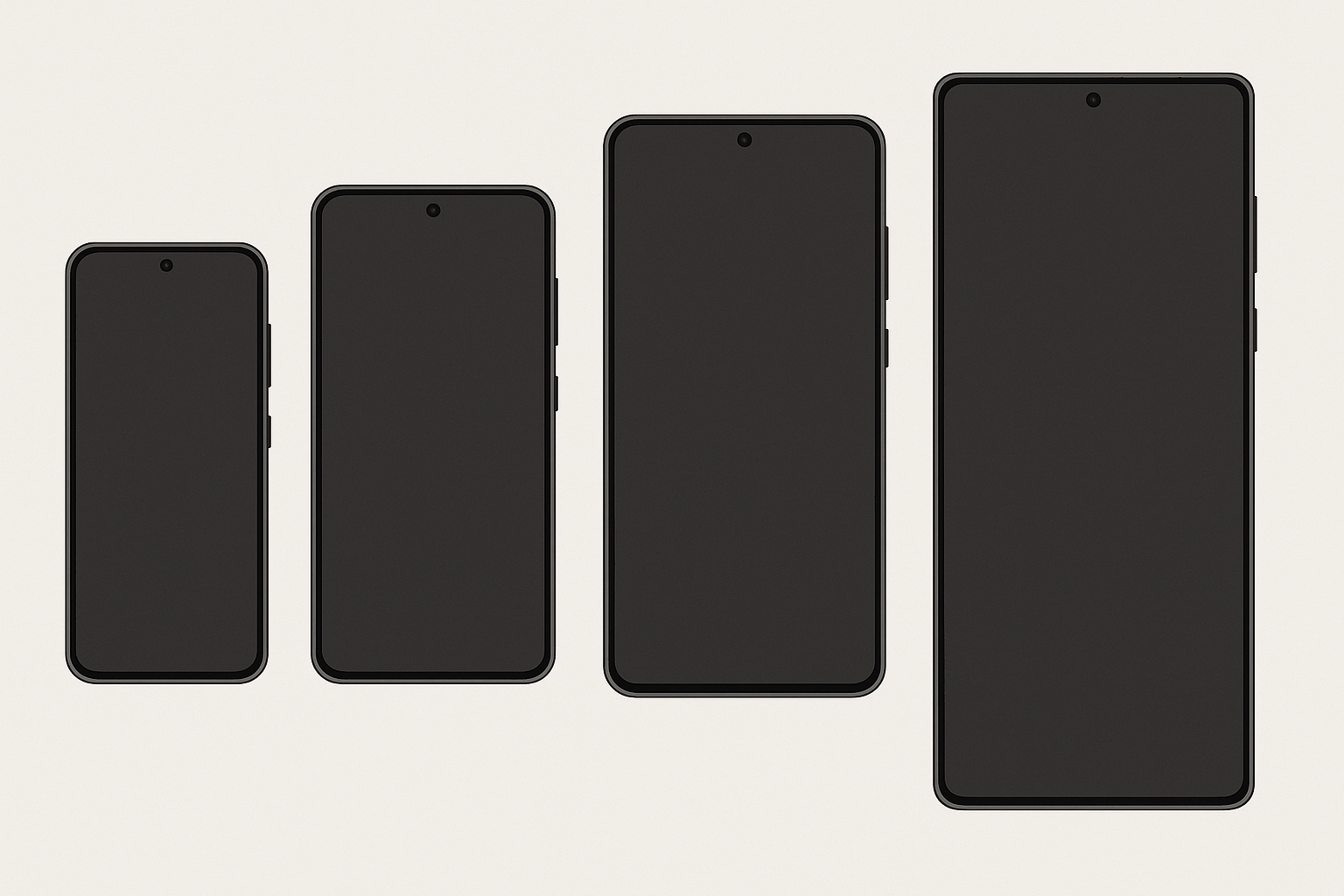
Protecting Your Large Screen Investment
Look, I've broken more phone screens than I care to admit. Large screen phones are particularly vulnerable because, well, there's more screen to break. Here's what I've learned from expensive mistakes:
Your Samsung phone's expansive display is its most valuable and vulnerable component. Whether you've invested in the revolutionary 7.9-inch foldable screen or the brilliant 6.8-inch display of a flagship, protecting that investment becomes crucial - especially when repair costs can hit $400+.
Large screen phones face unique challenges that smaller devices don't. Their increased surface area makes them more susceptible to drops and impacts. Plus, the tendency to use these devices more frequently for media consumption, productivity tasks, and gaming increases exposure to potential damage.
Cases Are Non-Negotiable
I don't care how careful you think you are - get a case. Rokform makes some excellent options that actually protect without adding crazy bulk. Their military-grade polycarbonate construction - the same material used in police armor - provides 6-foot drop protection from all angles.
This level of protection becomes essential when you're carrying a $1,200+ device with a premium display. The 360-degree protection shields your screen, camera modules, and vulnerable corners against the impacts that cause expensive repairs.
Magnetic Mounting Solutions That Actually Work
Large screen phones are perfect for navigation, video calls, and media consumption - activities that benefit from hands-free positioning. Rokform's magnetic mounting system uses powerful N52 Neodymium magnets that are 2-3 times stronger than competitors, ensuring secure mounting even with larger, heavier devices.
The RokLock™ twist-lock system provides additional security for professional applications. Whether you're using your device for GPS navigation during road trips or video conferences for work, these mounting solutions keep your device secure and positioned optimally.
Charging Solutions for Power-Hungry Displays
Large screen Samsung phones consume significant power due to their expansive displays and high refresh rates. Rokform's wireless charging solutions integrate seamlessly with their mounting systems, keeping your device powered during extended use.
The RokLock™ Wireless Charger delivers 7.5W fast charging while maintaining secure magnetic mounting. This proves particularly valuable for navigation use, where large screen phones provide excellent visibility but drain batteries quickly.
Screen Protectors Actually Work Now
I used to skip screen protectors because they felt cheap and plasticky. Modern ones are different - they're nearly invisible and actually prevent scratches and minor impacts. On a $1,200 phone, a $30 screen protector is cheap insurance.
The key is getting quality tempered glass protectors that maintain touch sensitivity and don't interfere with features like fingerprint sensors.
Insurance Considerations
With large screen phones costing more than some laptops, insurance becomes worth considering. I learned this the hard way when I cracked the screen on my first Galaxy Note. The repair cost was almost half the price of a new phone.
Most carriers offer insurance, but read the fine print. Deductibles can be steep, and they often give you refurbished replacements instead of new devices. Sometimes manufacturer warranties or credit card protection offer better coverage.
Ready to protect your large screen Samsung investment? Explore Rokform's Samsung-compatible cases and mounting solutions designed specifically for the unique needs of large screen phone users.

Final Thoughts
After testing dozens of Samsung's large screen phones over the years, here's my honest take: the "best" phone completely depends on what you actually do with it.
If you're all about that cutting-edge life and money isn't a major concern, the Galaxy Z Fold 7 is genuinely revolutionary. That tablet-to-phone transformation never gets old, and the productivity benefits are real. Just be prepared for the learning curve and extra care required.
For most people, the Galaxy S25 Ultra hits the sweet spot. Massive 6.8-inch screen, incredible cameras, S Pen functionality, and the durability of a traditional smartphone. It's expensive, but it'll last you years and handle everything you throw at it.
Budget-conscious but want that big screen experience? The Galaxy A55 5G proves you don't need to spend a fortune. That Super AMOLED display looks almost as good as phones costing twice as much, and the 120Hz refresh rate makes everything feel smooth and premium.
My personal recommendation? I'm currently using the Galaxy S25 Ultra as my daily driver, with a Z Fold 6 for travel and productivity work. The Ultra handles 90% of my needs perfectly, while the foldable comes out when I need that extra screen real estate for serious work.
Here's what I wish someone had told me before my first large screen phone purchase: you'll never want to go back to a small screen. Seriously. I tried using my old iPhone 12 mini recently, and it felt like looking through a keyhole. Once you experience media consumption, reading, and general phone use on a large, high-quality display, regular-sized phones feel cramped.
Samsung has democratized large screen technology across every price point. Whether you're spending $300 or $2000, you can get a genuinely great large screen experience. The differences are in build quality, camera capabilities, and premium features - but that core big screen experience is available to everyone.
Foldable phones represent the cutting edge of large screen technology, providing tablet-style experiences that fold into pocketable devices. However, traditional flagships continue to offer the best balance of screen size, durability, and functionality for most users. Mid-range options prove that impressive large screen experiences don't require flagship pricing.
Consider your primary use cases when choosing between these options. Media consumption and gaming benefit from the largest possible screens, while productivity tasks may favor the unique multitasking capabilities of foldable devices. Photography enthusiasts will appreciate the large, color-accurate displays found on Samsung's premium models.
Remember that screen size is just one factor in the overall smartphone experience. Build quality, camera capabilities, battery life, and software support all contribute to long-term satisfaction. Samsung's commitment to extended software support across their lineup ensures your large screen investment remains current and secure for years to come.
Don't overthink it. Pick your budget, decide if you want to try foldable technology or stick with traditional designs, and jump in. The worst thing that'll happen is you'll wonder why you waited so long to upgrade.
And seriously - get a good case. Trust me on this one.









